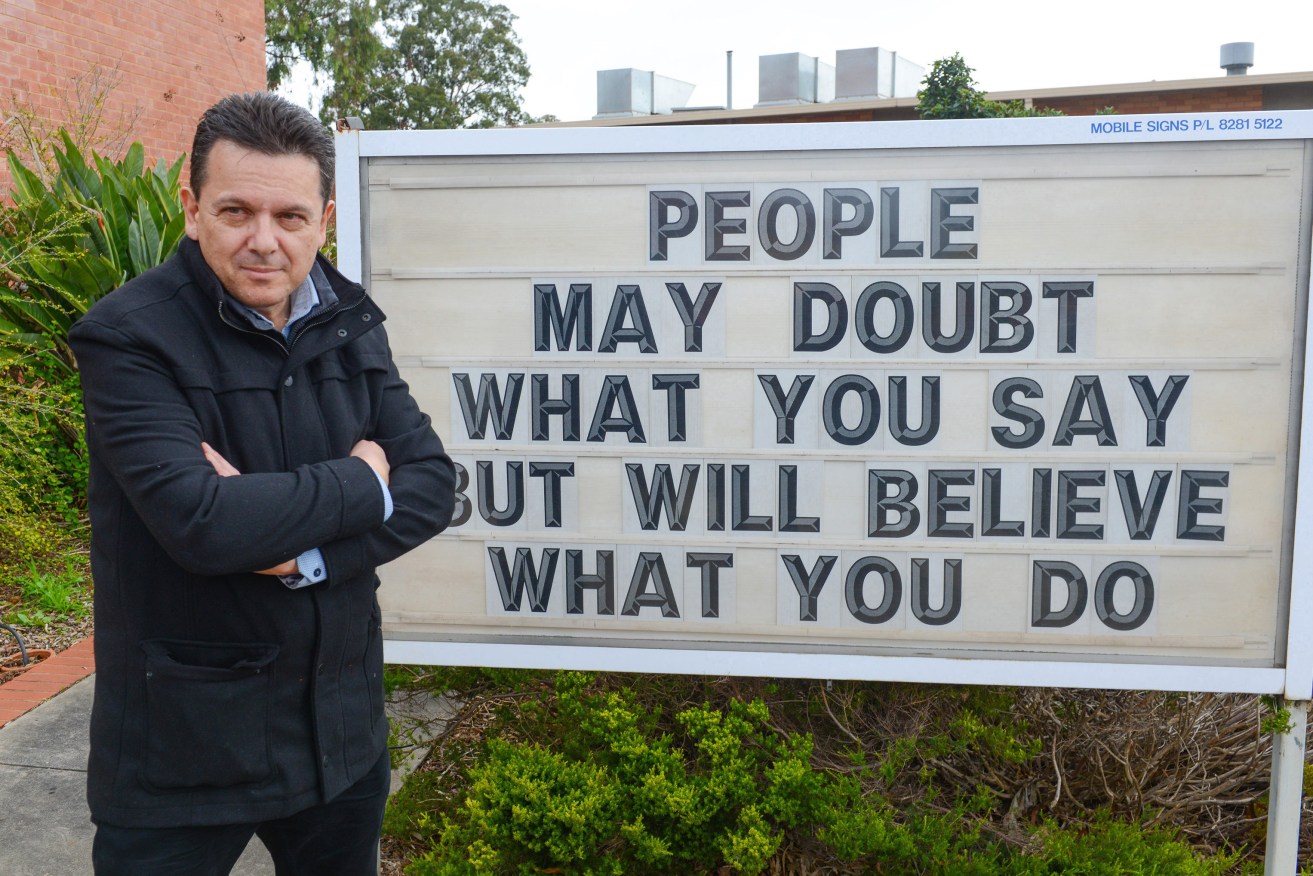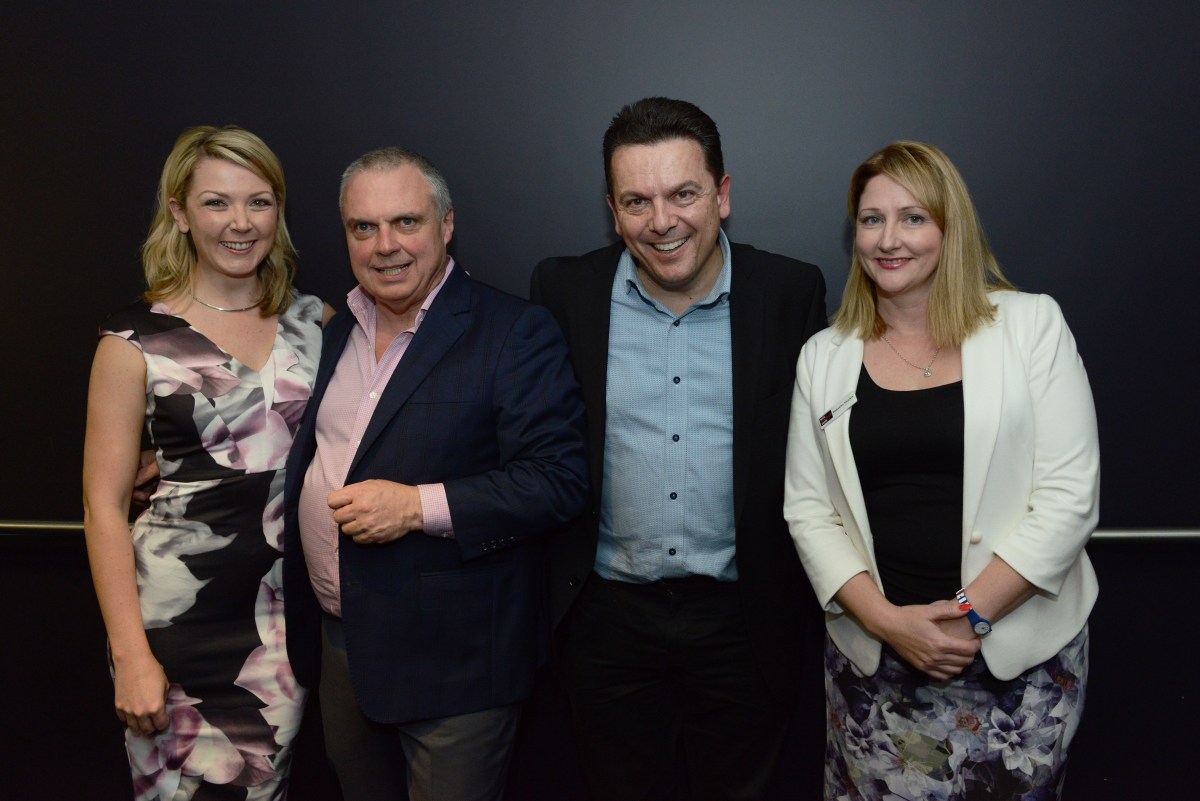A rejection of political advisors, and their ill-advised leaders
Malcolm Turnbull’s gamble, like David Cameron’s before him, has opened the floodgates on a wave of anti-establishment sentiment. Former Liberal MP Mark Brindal considers the rise of the independents – and the future of the major parties.

A MESSAGE FROM ON HIGH? Independent Senator Nick Xenophon outside a polling booth at a church in Glynde yesterday. Photo: Brenton Edwards, AAP.
Saturday’s election may well prove a watershed in Australian political history.
Not wanting to be fettered by a gaggle of independents, the parliament changed the voting system for the Senate and the Prime Minister called a double dissolution election to sweep the cupboard bare.
Both major parties campaigned vigorously against the election of independents. Malcolm Turnbull warned explicitly about voting for stability while Labor ran a comprehensive series of ads to discredit Nick Xenophon and his team.
Yet as the smoke clears it becomes obvious that electors have continued to turn their backs on the major parties. The Government have been saddled with its worst nightmare.
A hung parliament looms as an outside prospect, but the best case for the Coalition is that it will govern with a slender majority, a decimated mandate and internal ructions resurfacing – and having to negotiate with a senate crossbench that is arguably even more ominous than the last manifestation, including a resurgent One Nation, the outspoken Derryn Hinch and, as expected, Xenophon holding sway.

HOLDING SWAY: Nick Xenophon with his likely Senate Team-mates Skye Kakoschke-Moore and Stirling Griff, and new Mayo MP Rebekha Sharkie. Photo: Brenton Edwards, AAP.
The question is why?
Campaigns based half-truths and innuendo; campaigns whose thrust is “you’ve got to pick us because the other mob is worse” are the most obvious reason. However, that approach was, I believe, symptomatic of a much more deep-seated malaise.
For decades the ALP and the Liberal National Coalition have constituted the heart of the Australian body politic. That body has a serious heart problem and may well be terminal.
The problem lies not only with the patient but also with the doctors.
In an increasingly switched on world, marketing firms, PR companies and spin-doctors are kings. If there is any doubt, consider Sir Lynton Crosby, dubbed publicly the Wizard of Oz and now knighted for his part in the David Cameron’s election.
Political parties rely on their focus groups and polling. Politicians are advised what to say and when and even how to say it. But the gurus are not infallible.
In 1988, John Olsen used to meet regularly with his marginal seat candidates. He presented them with a list of the major issues with which South Australian voters were concerned, as determined by the PR gurus. While every candidate reported that the environment was an issue it was not ranked at all. John was astute and followed up the matter. He reported subsequently that his candidates were correct; the firm had polled voters then aggregated the top 10 issues, which were the number one issue for voters. They subsequently found that while the environment was the number one issue for very few it was overwhelmingly the number two issue for most electors; value weighted it was the biggest issue of the campaign and it had been overlooked.
There is an adage in politics: never ask a question unless you know the answer.
In his opinion piece last week, Professor Charles Lees did not consider that David Cameron would have sought advice about the advisability of conducting a referendum. He would have been told that the majority of British citizens were in favour of remaining in the EU. What his experts had not factored into their advice was that, with voluntary voting, the national will could be skewed by voter turnout.
History might well record that in course of a week, unelected, faceless spin-doctors unraveled the United Kingdom and put the body politic of Australia into a terminal condition.
But there is an even deeper problem. Even the best doctor can only work with the patient as they present themselves for treatment.
The fundamental problem is that the traditional heart of Australian politics is terminally ill. Both the ALP and the Liberal/National parties have, in their current form, outlived their relevance.
Seventy percent of Australians identify themselves as middle class. When there was a crisis on the conservative side of politics, Menzies realised and exploited this.
He formed the Liberal Party, spoke for and to Middle Australia and held power of decades. Similarly, beginning with Whitlam, the ALP has sought out and at times, won, that middle ground. Both parties still claim to represent it.
But what Lees says of Britain captures middle Australia too: “The grievances that fuel provincial populism are economic decline, globalisation, demographic change, pressure on services, disappointment with their own lives, fears for their children’s future.”
Both parties made token forays into that territory, the Libs with “Jobs and growth”, Labor with “Mediscare”.
Were these any more than a token attempt to make us believe that they are still “in touch” with the pulse of middle Australia? Many in the electorates apparently thought not.
Few of us are single issue people. We do have range of concerns and they include issues like Indigenous Welfare, Gay Marriage, Multiculturalism and Overseas Trade.
Where were the major parties on such issues? Both are either complicit, too afraid to express other than the “politically correct” opinion or afraid of a vocal minority backlash. They remain silent until prodded. If forced, they sprout meaningless, insincere mumbo jumbo.
It’s left to independents (often from the more extreme right of the political spectrum) to give voice to our concerns. When we hear them voicing what’s on our minds, is it surprising then that they pick up votes?
One of my conservative friends once told me that he was thinking about voting for Pauline Hanson. When I asked him why, he replied that, on a couple of issues about which he cared, she made a lot of sense. I asked what he thought of her opinion on several others? His reply was that her position was so extreme as to be stupid so she must eventually rethink it. I reminded him that in the 1930s many Germans had thought the same way. They elected Hitler.
The 2016 election proves that, in the minds of an increasing number of Australians, the light on the hill has gone out and the Liberals have lost their way.
The proof of “a pox on both your houses” is the rise of the independents.
The teams in whom our confidence has rested for almost a century have put at risk the fabric of Australian democracy. We can only pray that they might either find the wisdom to reconnect with Australia’s heartland or that a new force emerges, which sweeps them into the political dustbin.
Should the parties doubt these words and survive to be given the chance to test this hypothesis, I suggest a challenge.
At the next election install an additional ballot box and mark it clearly: “Decline To Vote”. Unless things change it could well win the next election.
Mark Brindal was a state Liberal MP from 1989 until 2006. He is now involved in academic writing and is a public policy consultant.




